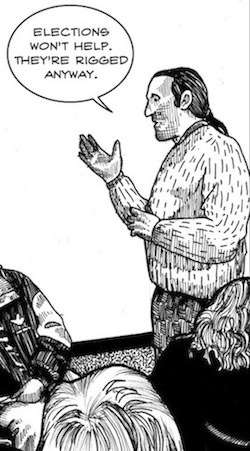The Political Process Has Many Problems, But the Fact That Activists Have a Microphone Is Not One of Them
Are conservative media responsible for congressional dysfunction?

Jackie Calmes of The New York Times has written a much-discussed study for the Shorenstein Center on the state of the American right. It's a very long paper with little new to say; you can boil most of its thesis down to three points:
1. The "leaders of the Republican Party do not fully control its agenda."
2. The people jostling them out of the way are the conservative media.
3. As a result, Republicans are not able "to govern."
The first point is basically true. The "party elders," as Calmes calls them, have seen several policies they support either killed or wounded by the party's base. This does not strike me as a panic-worthy development. I agree with that base on some of those issues (such as Common Core) and disagree with it on others (such as immigration), but as a broad principle, it's hard to be upset about the fact that angry citizens can sometimes shoot down policies they dislike.
The second point is more debatable. Calmes' conception of conservative media includes not just the hierarchical Fox News but the more decentralized world of AM talk radio (not as diverse as it used to be, but still splintered) and the even more horizontal realm of the Internet. For all the manipulation and groupthink that go on in these spheres, they do not speak with a single voice. And as Jack Shafer points out in his response to Calmes, they haven't necessarily been much better at keeping the base under control than the old establishment is:
If conservative media is as powerful as Calmes posits, why can't it discipline the 17 squabbling presidential candidates and unify the party behind its candidate? (Which would be who? Ted Cruz? Rick Santorum? Ben Carson?) If conservative media is so powerful, why has Speaker of the House John Boehner, who is as much a "governance" Republican as walks the planet, been able to cream two recent challenges to his leadership by hard-line conservatives? How did the conservative media ever allow the nomination of such mushy Republicans as John McCain and Mitt Romney?
One significant story threading through the 2012 election, in case you've forgotten, was the Tea Party movement losing one battle after another.

A possible reply to Shafer is that the media don't all need to keep people in line—that they're out to disrupt a consensus, not to create one. That is, more or less, what Calmes is getting at in point number three: that the crowd is complaining rather than governing.
And yet she also writes this, after recounting the battle earlier this year over immigration and homeland-security funding:
By spring, Congress did pass a series of significant measures—addressing terrorism insurance, human trafficking and veterans' suicides, for instance, and fixing a longtime policy headache involving Medicare reimbursements to doctors. But Democrats' cooperation had helped, and no one interpreted those achievements as a sign that Republicans would be able to perform the bigger, essential governing tasks that loomed, of passing annual appropriations bills and raising the nation's debt limit, without the messy intraparty ruptures and brinkmanship of recent years.
Look: I fully recognize that the budget process has been especially dysfunctional lately. But consider what that passage basically says:
1. Rather than refusing "to govern," Congress did, in fact, pass several significant bills.
2. It often did so in a bipartisan manner.
3. But it will be harder to pass some other bills coming up without "messy" political fights.
When are political fights not messy? And given how much disagreement there is about how the government should be spending money (and about whether regularly raising the debt limit is an "essential governing task"), isn't it good that this stuff will kick up some fights? Politics without conflict is politics that excludes people. I have little love for the Republican milieu of 2015, but I have even less affection for the idea of a chummy group of pols keeping a lid on citizen discontent.
I mean, just listen to some of the people quoted in Calmes' paper:
"If you stray the slightest from the far right," said former Senate Majority Leader Trent Lott, who continues to advise Republican congressional leaders, "you get hit by the conservative media."
Lott sounds like one of those center-left feminists driven to distraction by the fact that further-left feminists criticize them on Twitter. Sure, Trent: If people disagree with you, they can "hit" you by expressing that disagreement. Sometimes they will be jackasses spouting drivel. Sometimes they will have a point. Either way, it's not a crisis. I have a ton of problems with Congress, the Republican Party, and, yes, conservative media. The fact that people find it easier to complain and to mobilize is not one of them.


Show Comments (28)